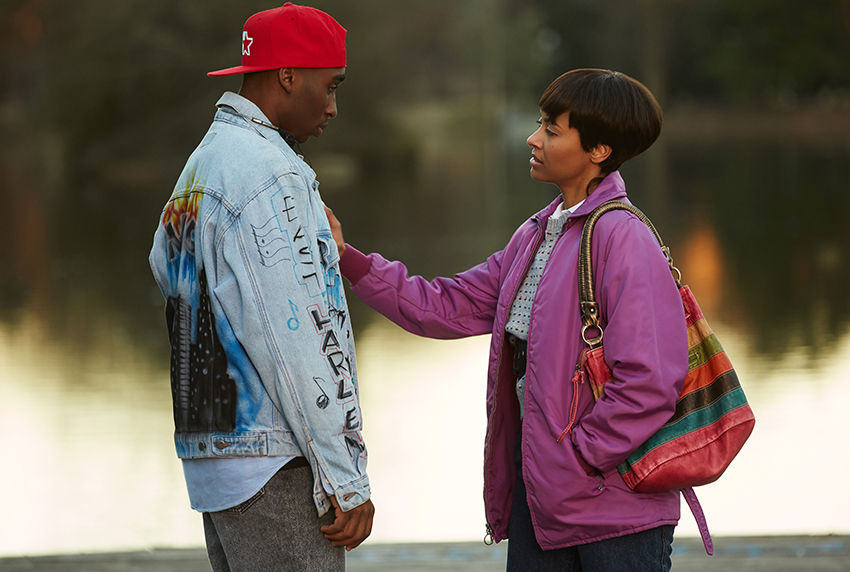The end credits of “All Eyez on Me,” the new biopic recounting the life and tragic murder of `90’s hip-hop icon Tupac Shakur, features a captivating clip from a 1994 interview with Shakur that, despite being just 20 seconds long, reveals so much about the rap legend: his uncompromising honesty and candor, his unique outlook on life and his rare, refreshing self-awareness. Sadly, this clip was the one sequence in the entire film that lingered with me, as I left the theater thinking to myself, “Where was that for the last two-and-a-half hours?”
After being put into motion in early 2011, the much maligned Tupac biopic production spent five years in “development hell,” undergoing several creative overhauls and switching directorial hands multiple times before finally landing under the reins of music video director Benny Boom. Though the final product, which was released nationwide June 16, isn’t without its inspired moments, its insipid, paint-by-numbers storytelling leaves little doubt as to why this film’s journey from script to screen was such a painstaking one.
The film’s lack of creativity rears its ugly head from the get-go, as the narrative begins in 1995 with Tupac’s (Demetrius Shipp Jr.) brief incarceration at a New York correctional facility. He’s visited by a journalist for an interview, which results in the interviewer asking questions that tee up a series of flashbacks, perhaps the laziest storytelling device in all of cinema. Honestly, these flashback montages should come with subtitles that read, “Sorry, we didn’t have the time for a rewrite.”
As we revisit Tupac’s tumultuous childhood and teen years, his entry into the music industry and the early stages of his infamous and ultimately fatal rivalry with fellow rapper Notorious B.I.G., any gravity these flashbacks might have carried is wasted by Boom rushing wildly back and forth between the past and the present. No scene is allowed to breathe long enough for it to resonate with the viewer.
As the narrative timeline races manically to Tupac’s release from prison, the flashbacks mercifully cease. But, unfortunately, Boom’s hurried pacing resumes. It’s difficult to determine what Boom lacks confidence in: the audience, himself or, most likely, a combination of the two. It’s remarkably clear, however, that Boom has little interest in challenging us to contemplate what Tupac’s story can teach us about ourselves and about society; he’s content merely to spoon-feed us a melodramatic reenactment of every footnote on Tupac’s Wikipedia page.
Shipp deserves a lot of credit for his valiant acting effort in taking on the role of a larger-than-life personality in his first-ever major movie role. And from a physical standpoint, Shipp bears a striking resemblance to Tupac! Though his vocals lack Tupac’s signature rasp, his mannerisms are so spot-on that you’ll find yourself doing a double take during the concert/music video scenes to make sure you’re not watching real footage of Tupac himself.
Part of what made Tupac a fascinating personality was that both his talents and his troubles knew no bounds, and that he was open about his flaws as he struggled to navigate through fame. Because of Boom’s maddening direction, however, Shipp, through no fault of his own, never manages to portray Tupac as anything more than a happy-go-lucky magnet for bad luck.
Despite some solid efforts from the rest of the cast, particularly from actress Danai Gurira in her turn as Tupac’s resolute mother, the rest of the characters in the film suffer the same fate and rarely see more than their surface getting scratched.
Given the fact that Tupac, in his tragically brief lifetime, was renowned as such an innovative and intriguing entertainer, “All Eyez on Me” (which is rated R) feels like much worse than simply a missed opportunity — it seems like the ugliest of ironies.

